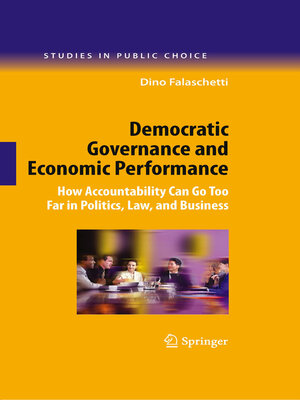Democratic Governance and Economic Performance
ebook ∣ How Accountability Can Go Too Far in Politics, Law, and Business · Studies in Public Choice
By Dino Falaschetti

Sign up to save your library
With an OverDrive account, you can save your favorite libraries for at-a-glance information about availability. Find out more about OverDrive accounts.
Find this title in Libby, the library reading app by OverDrive.



Search for a digital library with this title
Title found at these libraries:
| Library Name | Distance |
|---|---|
| Loading... |
Conventional wisdom warns that unaccountable political and business agents can enrich a few at the expense of many. But logically extending this wisdom implies that associated principals – voters, consumers, shareholders – will favor themselves over the greater good when 'rules of the game' instead create too much accountability. Democratic Governance and Economic Performance rigorously develops this hypothesis, and finds statistical evidence and case study illustrations that democratic institutions at various governance levels (e.g., federal, state, corporation) have facilitated opportunistic gains for electoral, consumer, and shareholder principals. To be sure, this conclusion does not dismiss the potential for democratic governance to productively reduce agency costs. Rather, it suggests that policy makers, lawyers, and managers can improve governance by weighing the agency benefits of increased accountability against the distributional costs of favoring principal stakeholders over more general economic opportunities. Carefully considering the fundamentals that give rise to this tradeoff should interest students and scholars working at the intersection of social science and the law, and can help professionals improve their own performance in policy, legal, and business settings.







